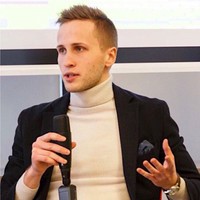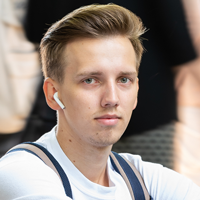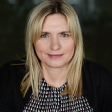International Business and Start-up Entrepreneurship
Programme Fact File
Management, Administration and Real Estate Management
accredited until
Bachelor of social sciences in management and administration
8:00–18:00
24 full fee
Curriculum and format
Curriculum
The programme's content is based on real economics and business. Over the course of six semesters students will progressively develop knowledge, skills and competencies in international business and start-up economics and management. Regarding how the programme's content is presented, equal attention is given to how knowledge is delivered and co-produced as well as to how courses are formatted. This includes activities outside classes and seminars in the real business and economic management environment and relating different courses to one another (for example how maths is used in business, or how to use communication skills to sell business ideas to investors).
- Knowledge Development in Contemporary Trends in Economics and Business
- Digital Economics
- Environmental Economics and Finance
- Communication Skills, Ethics and Cross-Cultural Relations in Business
- Resource Management:
- Innovations, Creativity
- Finance, Risk Capital, Securities
- Talent Management
- Market Research, Marketing
- Strategic and Change Management
- Leadership and Pitching to Investors
- Specialisation Modules:
- Start-up Entrepreneurship
- Social Entrepreneurship
- Health Economics
- Additional voluntary courses
Study format
Students will acquire the curriculum of the programme in a variety of study formats - activities outside classes and seminars in the real business and economic management environment, study visits abroad as well as to international companies in Latvia, business problem solving using simulations, practical semester projects and collaboration with the RSU B-Space Business Incubator to develop business ideas and learn how to pitch to investors, etc.
- Studies in English
- Broad international context
- international guest lecturers
- international students
- study visits abroad
- study visits to international companies in Latvia
- guest lecturers on business from international companies in Latvia
- Lecturing in teams, interactive studies
- Problem-based (PBL) studies and simulation-based higher education – real business problem solving
- Practical semester projects, including collaboration with the RSU Business Incubator
- Development of business ideas and pitching to investors
- Study placements at companies
- Bachelor thesis selection competition for entrepreneurs
- Syllabus
1. semester Category Course code Course title Structural unit Course supervisor ECTS A SBUEK_167 Applied Enterpreneurship Faculty of Social Sciences Kristaps Zaļais 6 A SBUEK_178 Applied Microeconomics and Mathematics in Business Faculty of Social Sciences Irina Možajeva 6 B VC_119 Business English and Concise Writing Faculty of Social Sciences Sniedze Vilde 12 B VC_125 Business English and Concise Writing Faculty of Social Sciences Sniedze Vilde 9 A SBUEK_176 Business Research Methodology Faculty of Social Sciences Romāns Putāns 6 A AURK_062 First Aid and Civil Protection Department of Anaesthesiology, Intensive Care and Clinical Simulations Oļegs Sabeļņikovs 3 A SBUEK_175 Semester project I - Orientation and Integration Faculty of Social Sciences Romāns Putāns 3 2. semester Category Course code Course title Structural unit Course supervisor ECTS A SBUEK_179 Applied Macroeconomics and Statistics Faculty of Social Sciences Tatjana Boikova 6 A SBUEK_177 Business Communication and Ethics Faculty of Social Sciences Jana Bunkus 6 B VC_125 Business English and Concise Writing Faculty of Social Sciences Sniedze Vilde 9 B VC_119 Business English and Concise Writing Faculty of Social Sciences Sniedze Vilde 12 A SBUEK_180 Fundamentals of Accounting and Finance Faculty of Social Sciences Anželika Berķe-Berga 6 B VC_124 Latvian Language Course for Foreign Students Faculty of Social Sciences Inga Laizāne 3 A SBUEK_192 Semester Project II - Knowledge Integration Faculty of Social Sciences Romāns Putāns 6 3. semester Category Course code Course title Structural unit Course supervisor ECTS A SBUEK_185 Business and Societal Governance / International Exposure I - Brussels Week Faculty of Social Sciences Romāns Putāns 9 B VC_120 Second Language (German) and Intercultural Relations Faculty of Social Sciences Dace Žibala 18 B VC_122 Second Language (Spanish) and Intercultural Relations Faculty of Social Sciences Aleksandrs Timofejevs 18 A SBUEK_186 Securities Market. Experience of Europe Faculty of Social Sciences Anželika Berķe-Berga 3 A SBUEK_187 Semester Project III - Leadership and Pitches at RSU Business Incubator Faculty of Social Sciences Kristaps Zaļais 6 A SBUEK_184 Start-up Patents Faculty of Social Sciences Līga Sileniece 6 4. semester Category Course code Course title Structural unit Course supervisor ECTS B SBUEK_196 Behavioural Economics Faculty of Social Sciences Romāns Putāns 6 B SBUEK_194 Digital Health and MedTech Development Faculty of Social Sciences Romāns Putāns 6 B SBUEK_171 Innovation Management and Creativity Faculty of Social Sciences Kristaps Zaļais 6 B SBUEK_181 International Business and Marketing Faculty of Social Sciences Laura Martinsone-Ozoliņa 6 B VC_120 Second Language (German) and Intercultural Relations Faculty of Social Sciences Dace Žibala 18 B VC_122 Second Language (Spanish) and Intercultural Relations Faculty of Social Sciences Aleksandrs Timofejevs 18 A SBUEK_193 Semester Project IV - Practice Integration I Faculty of Social Sciences Romāns Putāns 6 B SBUEK_188 Talent Management in International Business Faculty of Social Sciences Olga Leontjeva 6 B SBUEK_189 Venture Capital Faculty of Social Sciences Līga Sileniece 6 5. semester Category Course code Course title Structural unit Course supervisor ECTS B SBUEK_190 Environmental Economics and Finances Faculty of Social Sciences Romāns Putāns 6 B SBUEK_183 Process Management for Sustainable Business Development Faculty of Social Sciences Jekaterina Pankova 6 B VC_120 Second Language (German) and Intercultural Relations Faculty of Social Sciences Dace Žibala 18 B VC_122 Second Language (Spanish) and Intercultural Relations Faculty of Social Sciences Aleksandrs Timofejevs 18 A SBUEK_191 Semester Project V - Practice Integration II Faculty of Social Sciences Romāns Putāns 6 B SBUEK_170 Social and Legal Aspects of Digital Economy Faculty of Social Sciences Tatjana Muravska 6 B SBUEK_172 Strategic and Change Management Faculty of Social Sciences Romāns Putāns 6 6. semester Category Course code Course title Structural unit Course supervisor ECTS A SBUEK_239 Development, Presentation and Defence of a Bachelor's Thesis Faculty of Social Sciences Romāns Putāns 27 A SBUEK_023 Methodical and Theoretical Seminar of the Development of Bachelor's Thesis Faculty of Social Sciences Inna Dovladbekova 3
Admissions requirements
Career opportunities after graduation
Graduates of the study programme can work as specialists in economics and international business and start-up management, as entrepreneurs, researchers, managers, experts, business consultants, project managers, business analysts or economists.
Graduates of this program will be confident in economic trends and able to make strategic, ambitious, bold and informed decisions .
Feedback
It is essential for any potential entrepreneur that the university not only provides a theoretical education, but also gives an introduction to the dynamic business environment, demonstrates how to create a successful start-up and assists in establishing the first contacts in Latvia and abroad. The new programme is designed to be very close to the industry, which benefits both students and the business environment.
Sergejs Jakimovs,
Co-Founder of start-ups Vortexoil and Koatum, Board Member and Strategist at Longenesis, RSU visiting lecturer
Business today has no borders on the map. I started developing my mobile app Drone Pilot in Riga, continued in Estonia, but am now working on it in London. RSU is the most international among Latvian universities – a quarter of students are from abroad, and these are ideal conditions to prepare for the international environment that awaits every start-up entrepreneur.
Kristers Jurševskis,
Co-Founder of start-up Drone Pilot, RSU graduate
Head of Programme
Contact Information
Faculty of Social Sciences
Fri, 8:30 -15:30






